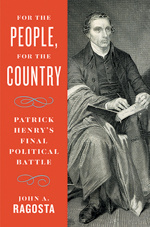Today, we are happy to bring you our conversation with John A. Ragosta, author of For the People, For the Country: Patrick Henry’s Final Political Battle.
What inspired you to write this book?
Serendipitously, I came across George Washington’s January 1799 letter begging Patrick Henry to come out of retirement to stop a likely civil war being brought on by Thomas Jefferson and James Madison, and I was hooked. As extensive research unfolded the story, I realized that this is an important tale about how a democracy should work, with enormous modern implications. I realized that rather than a fire-breathing idealogue (as he is often portrayed), Henry was deeply committed to the success of the nation and working within the law, as he said, seeking change in “a constitutional way.” Sadly, understanding that those opposing government policy must work for reform in “a constitutional way” is a lesson all too relevant today.
What did you learn and what are you hoping readers will learn from your book?
We are all familiar with the first rule in a democracy: The majority must rule. The second rule, though, is equally important: The minority must accept rule by the majority (at least until the next election). Faced with hyper-partisanship in the 1790s, the Founders had to develop that understanding of a “loyal opposition;” it did not simply happen. Sadly, before that understanding was developed by Henry and others, the partisanship of the 1790s almost destroyed the nation, as Jefferson and Madison seemed to recognize belatedly. Interestingly, Henry’s historic memory and role in this crisis were largely suppressed by that same partisanship.
What surprised you the most in the process of writing your book?
I was surprised, and initially missed, how Jefferson, Madison, and their supporters very clearly retreated from the more radical embrace of “states’ rights” and a state’s ability to interfere unilaterally with the federal government. Within ten days of the adoption of the Virginia Resolutions (which he had drafted) Madison wrote to Jefferson suggesting that perhaps they had gone too far. With Henry and Washington dying in 1799, Jefferson was able to ascend to the presidency, but the Jeffersonians in 1800 and beyond evidenced a retreat from the more hardline position, reconsidering and moderating their position (what we want politicians to do, but they so rarely do). Still, given his personal animosity, Henry remained an “apostate” to Jefferson.
What’s your favorite anecdote from your book?
Having finished the manuscript (and, unfortunately, having already sent it to the publisher), I reread a well-known Benjamin Rush letter to Jefferson discussing the 1801 inauguration. What is commonly missed in that long letter is near the end when Rush reminds the president of a 1799 conversation during which Jefferson said that if Henry and Washington died (of course, their names were not written), the Jeffersonians’ electoral success would be far more “speedy, as well as certain.” This confirmed both the importance of Henry and Washington, and their deaths, to the election of 1800; it also confirmed how concerned Jefferson was with their opposition to his radical states’ rights agenda – both central conclusions of the book.
What’s next?
There is much work to be done at the International Center for Jefferson Studies in support of our fellowship program and Monticello’s public history offerings. At the same time, I am considering a new book on Jefferson’s presidency, using the discussion of that topic in this volume as a springboard. If I pursue that project, I am likely to look at several critical incidents in Jefferson’s presidency that provide a far broader understanding of his presidency than might at first appear. In the meantime, I always welcome opportunities to discuss this and other projects with the public.





